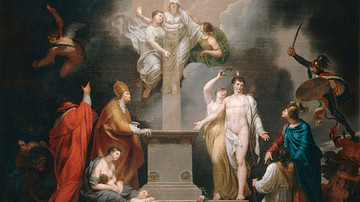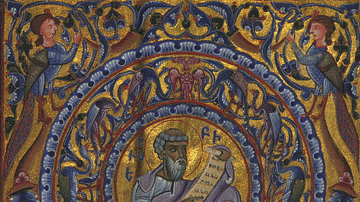Search
Search Results

Article
The Printing Revolution in Renaissance Europe
The arrival in Europe of the printing press with moveable metal type in the 1450s CE was an event which had enormous and long-lasting consequences. The German printer Johannes Gutenberg (c. 1398-1468 CE) is widely credited with the innovation...

Article
Medieval Knights: 12 of the Best
The knights of medieval Europe were meant to be the finest fighting men of their age, even more important, they were expected to be pure in thought and deed, as exemplified in the chivalrous code which they (usually) followed. Here are the...

Article
Luther's Speech at the Diet of Worms
Martin Luther's speech at the Diet of Worms (also known as the Here I Stand Speech) is considered one of the greatest pieces of oratory in world history. It was given in response to the council's questions on whether Luther would stand by...

Article
The Danish Conquest of England
The Danish conquest of England was not a singular event, but a series of large Viking invasions of England between 1013 and 1016, which eventually overthrew the native English dynasty. As a result, four kings from the House of Denmark ruled...

Article
Saladin's Conquest of Jerusalem (1187 CE)
Jerusalem, a holy city for the adherents of all three great monotheistic religions (Judaism, Christianity, and Islam) was conquered by the armies of the First Crusade in 1099 CE. The Muslims failed to halt their advance, as they were themselves...

Article
Harald Bluetooth & the Conversion of Denmark
In Scandinavia, Christianity spread due to the support and encouragement of political rulers at the top of the society above all else. Conversion, defined here as the actions taken by kings or clerics to introduce the new religion, did not...

Article
Napoleonic Concordat of 1801 & Religious Pluralism
The Napoleonic Concordat of 1801 defined France's relationship with the Catholic Church for over 100 years. The Organic Articles were added in 1802 and provided state recognition of the Reformed and Lutheran confessions alongside the Catholic...

Article
Christian Antisemitism in the Middle Ages & during the Reformation
Antisemitism is a modern term that describes prejudice and hostility to Jews and Judaism. The origins of Christian antisemitism in the gospels are based on the story of a 1st-century itinerant Jewish preacher, Jesus of Nazareth, in the Roman...

Article
Eusebius on Christianity
Eusebius Pamphili (aka Eusebius of Caesarea, 260-340 CE) was a Christian historian, exegete, and polemicist. He became the bishop of Caesarea Maritima in 314 CE and served as court bishop during the reign of Constantine I (r. 306-337 CE...

Article
Louis IX and Capetian Politics at Paris' Sainte-Chapelle
The Sainte-Chapelle in Paris was originally consecrated as a private royal chapel in 1248 during the reign of King Louis IX of France (r. 1226-1270), who was known in life as rex christianissimus ('most Christian king') and canonized in death...